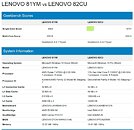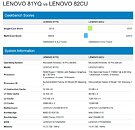Monday, July 6th 2020

Intel Core i7-1165G7 "Tiger Lake" Mauls Ryzen 7 4700U "Renoir" in Most Geekbench Tests
Intel's upcoming Core i7-1165G7 4-core/8-thread processor based on the 10 nm "Tiger Lake-U" silicon packs a mean punch in comparison to the AMD Ryzen 7 4700U processor, despite half the number of CPU cores. A Geekbench comparison between two Lenovo laptops, one powered by an i7-1165G7, and the other by a 4700U, shows a staggering 36.8% performance lead for the Intel chip in single-threaded performance, while also being 0.5% faster in multi-threaded performance. The i7-1165G7 features a 4-core/8-thread CPU with "Willow Cove" cores, while the 4700U lacks SMT, and is an 8-core/8-thread chip with "Zen 2" CPU cores. The game changes with the Ryzen 7 4800U, where the 8-core/16-thread chip ends up 22.3% faster than the Core i7-1165G7 in the multi-threaded test owing to SMT, while Intel's single-threaded performance lead is lowered to 29.3%.
Sources:
Geekbench Database 1, 2


43 Comments on Intel Core i7-1165G7 "Tiger Lake" Mauls Ryzen 7 4700U "Renoir" in Most Geekbench Tests
There can be a single-core CPU with 10000zillion times higher performance, and yet super slow in multi-threading environment.Not so funny joke. :rolleyes:
The next big thing is Meteor lake 80% ipc boost over comet. Accept nothing less.
Except that Zen 3 is coming, so that 1165G7 will still be slower than the newest AMD chips.
The majority of the starting ultra-books come with slaughtered on 4Gb-8GB on the board, for some of these, like the Dell Inspiron 7000 14, 8GB is the only option. These machines hang like it's going out of style when having a zoom/hangouts/skype call and having some tabs open in chrome + some other apps running.
Basically the ultrabooks that this is going into are so massively constrained on other aspects (screen/ram/ssd/bat/graphics) that the raw processor performance is typically way, way down on the list of importance. Knowing intel they will probably charge a premium, and as result will be a worse buy than the AMD systems at any given price point.
Geekbench, missing info and miracles do not generally happen in the real wotld. If this miracle was real, it would have been much bigger than s half assed Geekbench leak.
People need to get their act together tbh. The amount of spin and how easily some buy it... pfff
As for single core performance, I am expecting Tiger Lake to be better. Based on my observations, Zen 2 is generally close to about 10% faster than Intel's Skylake clock for clock. When we move to Ice Lake (Sunny Cove), its about approx 18% uplift from Skylake, clock for clock. So with Willow Cove, this should take the IPC gain even further.
Geekbench is an independent company, yes. But it is easy to game a benchmark since it is very predictable and easy to manipulate the score. Its worst when the leaks are mostly Geekbench results. Best is still to look at actual results in various tests.
AMD 4700U Vs Intel 1165G7
AMD 4700U 2.00 GHz
Single: 4923
Multi: 23314 (1457/Thread/GHz)
Intel 1165G7 2.80 GHz (+40%)
Single: 6737 (+37)
Multi: 23414 (+0.43%) (1045/Thread/GHz)
AMD 4800U Vs Intel 1165G7
AMD 4800U 1.80 GHz
Single: 5210
Multi: 28651 (995/Thread/GHz) cache size/architecture issue
Intel 1165G7 2.80 GHz (+56%)
Single: 6737 (+29%)
Multi: 23414 (-18%) (1045/Thread/GHz)
AMD right now has a pretty neat single die design that they can tweak for years. Intel was already tweaking to keep up and has diversified immensely. Lots of IP means lots of designs for essentially the same thing.
Mid-long term these chips dont mean a thing unless they can scale them up towards performance segment. Laptops die fast. The margins arent great. And with even the minor competition from AMD in this space, that margin is under pressure and AMD does carry a major cost advantage per chip. Intel relies on high volume to keep a stack populated with TGL chips. AMD has virtually full binning freedom.